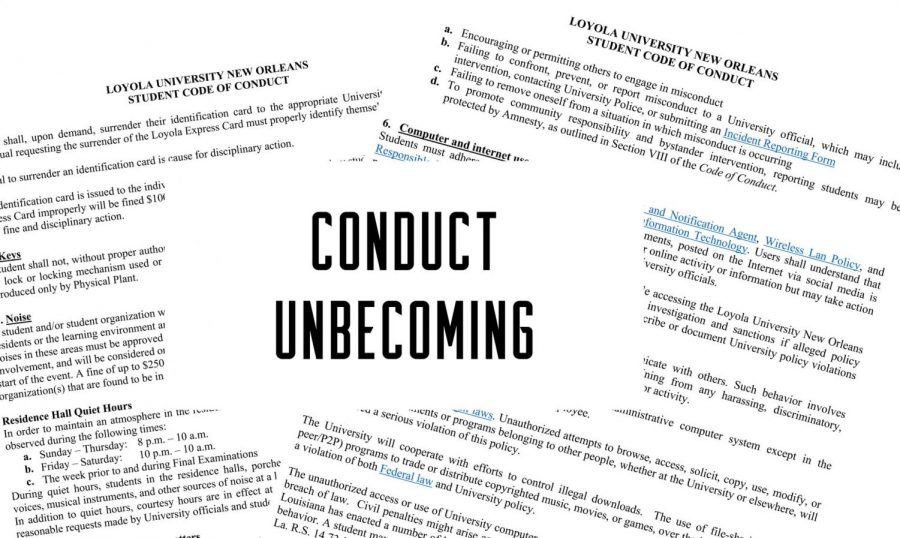Conduct Unbecoming: How the student code of conduct rules conduct hearings
April 29, 2021
Cristian Gilyard never expected his senior year of college to come to a halt like this. He had braved the initial onset of the COVID-19 pandemic, three years of school and time in the military. He was set on getting his diploma. But two months into his senior year, after a series of social media posts criticizing leaders of the Student Government Association that prompted those leaders to take out separation orders, Gilyard was in a university conduct hearing.
Two months later, Chris received notice of the hearing’s finding: He was suspended, unenrolled from online classes and removed from his dorm room in Cabra Hall.
Gilyard had run afoul of the Student Code of Conduct— an otherwise obscure document that might have been in a pile of things every incoming student signs mindlessly, but for him, it was the thing that ended what was supposed to be his senior year.
Gilyard said he thought his freedom of speech should protect the social media comments he made toward members of SGA’s administration, but the First Amendment does not apply to private universities.
Mark Vicknair, a New Orleans attorney who has represented students in code of conduct cases, said few students realize that it is the Student Code of Conduct, more so than state or federal law, that governs what rights students do and don’t have on a private college campus and in conduct hearings themselves.
While federal law can require schools that receive federal funding to adhere to certain guidelines in conduct hearings for Title IX cases, many private universities set their own standards for evidence and sentencing in student conduct cases.
Loyola’s student code of conduct covers everything from sexual assault and stalking, to more ambiguous statutes, including “conduct unbecoming” defined as “social behavior which might offend these rights, sensibilities, and dignity” and “persistent misconduct” which allows for students who have violated the code of conduct in the past to be charged when they continue to have run-ins with the conduct system.
In Gilyard’s case, his criticisms of SGA leaders on social media were classified as conduct unbecoming and his history of run-ins with the conduct process during earlier school years came back to haunt him, the system finding him responsible for persistent misconduct.
Gilyard said he felt he had a right to publicly critique SGA leaders on his social media due to their roles as political representatives on campus.
“How can you say I cannot give my opinion about their leadership, how they are conducting their leadership?” Gilyard said.
Gilyard was also found responsible for retaliation, for CC’ing a student on an email after they had taken out a university separation order against him, and violating administrative instructions for not showing up to a meeting he said he did not believe was mandatory.
The critical point: university conduct hearings are not courtrooms.
Any Loyola student has the right to allege a code of conduct violation by another student. When an allegation is made, the chief student conduct officer or other staff member reviews whether the allegation could be a potential conduct violation. The vice president of student affairs chooses whether the case should be brought before the Student Justice Board, a group of 10 students selected for one-year terms, or become a formal administrative hearing.
The charged student and complainant then receive emails notifying them of the case and charges.
“Formal rules of evidence applied in legal proceedings will play no role whatsoever in a hearing body’s work other than the hearing body will endeavor to consider evidence which in its sole discretion is relevant,” according to Section VI of Loyola’s Student Code of Conduct.
While Vicknair said he often represents students in Title IX cases that are tied to criminal charges, few students realize the two systems are completely different.
“This is not a criminal proceeding. You do not have constitutional rights attached. You don’t have the right to question or confront your accuser,” Vicknair said. “Hearsay is brought in quite often.”
Both the student filing a complaint and any charged students have the right to challenge the participation of any staff or Student Justice Board members in their case based on personal bias up to 24 hours before their hearing.
During the hearing, evidence, and in some cases witnesses, are presented to determine whether it is likely that the violation occurred.
The charged student can submit written statements from character witnesses and the student who brought forward the case can submit written statements from impact witnesses.
Gilyard said the manager of his case never reached out to an SGA senator who had submitted a written statement on Gilyard’s behalf and was willing to be a character witness for him in his case.
The hearing board can also consider the charged student’s conduct history when deciding on a sanction that can range anywhere from a fine or conduct warning, to, in Gilyard’s case, suspension from campus and removal from on-campus living.
“It felt like I was being treated as a criminal,” Gilyard said.
Gilyard said he felt retaliated against by some of the staff who handled his case due to his history with the conduct system and for having filed a complaint with the Department of Education’s Office of Civil Rights against a Loyola staff member in the spring of 2020.
Patricia Murret, associate director of student affairs, said that while the university does not comment on individual conduct cases for privacy reasons, the university believes the conduct process is fair.
“The student conduct process at Loyola is designed as a fair and equitable one, one that we are constantly refining and considering. The process allows for a thorough investigation, as well as an appeal. It is also designed with care and compassion and the Jesuit ideal of cura personalis in mind. While every case differs, each is treated with the utmost respect and care for anyone involved,” Murret said.
Outcomes of conduct hearing cases are confidential and “not to be shared with anyone other than those involved directly with the case,” according to the Code of Conduct.
Although the Code of Conduct says charged students will receive written notice in three to five school days of the hearing’s outcome and any imposed sanctions, Gilyard said it was nearly two months before he was notified of the outcome in his case.
During those two months, Gilyard filed a case against the SGA representatives who had filed a case against him. He claimed the SGA leaders had brought the case against him in retaliation for questions he asked about the SGA budget and criticisms he had made of the SGA administration.
Gilyard said he has not heard back from the university about the incident report he filed back in November.
Anyone found responsible for a conduct violation can appeal the ruling by submitting a complaint to the university within five school days of receiving their case’s outcome.
Gilyard said he had intended to appeal the ruling in his case and said he had told Chris Rice of his intent. But Gilyard did not fill out the paperwork to file an appeal.
It wasn’t until Gilyard was back in New Orleans after winter break that he was told he had missed his window for an appeal and would not be allowed on campus. Gilyard has since added multiple staff members involved with his case to a complaint with the Department of Education’s Office of Civil Rights.
Now, as Loyola’s class of 2021 prepares for graduation, Gilyard is living in Shreveport with his grandmother, waiting until he can return to Loyola and finish his degree.
“I have to wait until May to reapply for school,” Gilyard said.








